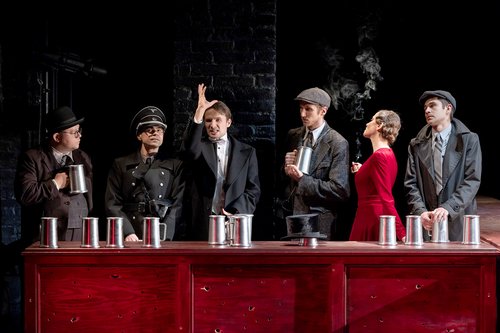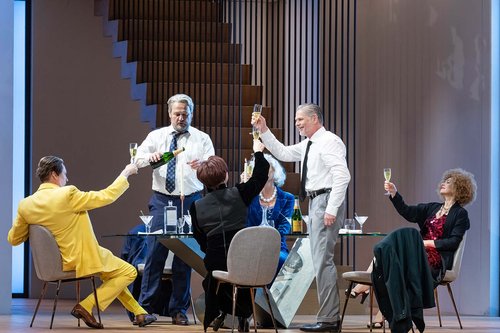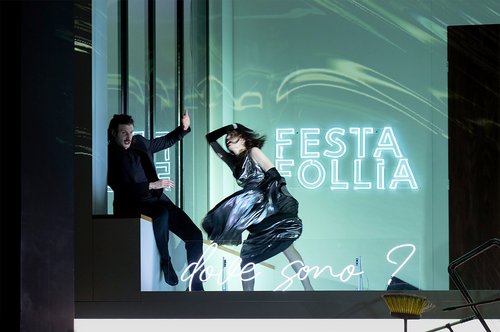Master and Margarita, Or, The Devil Comes to Moscow. Theatre 86. New York, 2024. Photo by Julie Skarratt. Courtesy of Theatre 86
Master and Margarita’s Adventures in New York
Formerly known as the Russian Arts Theater, New York’s Theatre 86 has staged ‘Master and Margarita, Or, The Devil Comes to Moscow’ in Pushkin Hall on the Upper West Side. The show is based on the famous epic novel by Russian writer Mikhail Bulgakov and has already received critical acclaim.
Mikhail Bulgakov’s novel ‘Master and Margarita’ is one of the most popular novels ever written in Russian, and is one of the best known in the West. A recent film adaptation by Michael Lockshin (b. 1981) became one of the highest-grossing films in Russia proof of its continued widespread appeal. But it has also sparked off a heated debate in Russia about whether the book was patriotic enough. After all, Bulgakov ridiculed the Soviet security services, from which Russia's current ruling elite originates.
Many of the phrases coined by Bulgakov in ‘Master and Margarita’ have since become commonplace expressions such as 'Never talk to strangers' and 'Manuscripts don’t burn.' I first read the novel as a pre-teen in a tiny provincial library, going back every day after school until I had finished it. For a long time, the Jerusalem chapters were all I knew of the New Testament. In fact, many have referred to these chapters as a 'New Testament for the 20th century.' The book weaves together three semi-independent narratives: the adventures of Woland and his entourage in 1930s Moscow, Pontius Pilate's trial of Yeshua Ha-Notsri (Jesus of Nazareth) in Jerusalem, and the story of the Master and his lover Margarita, which also takes place in Moscow.
Bulgakov spent the last years of his life writing ‘Master and Margarita’ in secret and died before he could put together a final authorized edition. The first censored version was only published in the 1960s, during the so-called 'Thaw.' To a degree, the Master’s fate mirrors that of Bulgakov himself. As he began writing ‘Master and Margarita’, he started an affair with a woman married to a prominent Soviet military officer. He also burnt the manuscript of the first version of the novel and Bulgakov’s own works were banned and ridiculed in the press, like the Master.
The novel is notoriously difficult to adapt for the screen, with most films and TV series that have come before Lockshin’s generally considered failures. Lockshin’s film blends the novel’s dark fantasy with elements of Bulgakov’s biography, resulting in a compelling, though rarely comical, interpretation. St. Petersburg-born, New York-based director Aleksey Burago (b. 1955) takes a different approach with his production of ‘Master and Margarita’ which results in a lively, dynamic performance, more fitting for a satire. This version is based on an adaptation by American playwright Jean-Claude van Itallie (1936–2021), who is also known for his translations of Anton Chekhov’s plays.
Burago, a Russian-American director, is a student of the late Pyotr Fomenko (1932–2012), a prominent Russian theatredirector, known for innovative and quirky productions. Burago’s production of ‘Master and Margarita’ was first staged in 2017, and this is its third iteration. The set, designed by Russian-American artist Valery Yershov (b. 1960), features the golden domes of Moscow’s orthodox churches interspersed with characters from the novel, painted using the actors as models. There are impressive special effects for the small budget of an independent theatre such as a tram that severs Berlioz’s head and starts a chain reaction of even crazier events. The lobby, where refreshments are served during the interval, is also themed around Bulgakov’s work and it features a some painted, anthropomorphic cats that greet the guests. A carnivalesque atmopshere permeates the entire first act, which chronicles the arrival of Woland and his entourage in Moscow, as well as Yeshua’s (Bulgakov’s version of Jesus Christ) fateful meeting with Pontius Pilate.
Tom Schubert pulls off a credible performance as Woland, the Devil incarnate, although at times his acting goes a little over the top. His entourage is introduced by name as the characters jump out of a suitcase, resembling a roll call of peoplelisted at the beginning of a play. At times, you feel as though you are in a circus rather than a theatre and while this provides comic relief, it falls short of fully capturing the sinister side of the characters reminding us that the novel invites more the one narrow interpretation.
Many of the actors play the part of more than one character, which sometimes creates a bit of confusion. At one point, Woland’s entourage searches for the vampire Hella, played by Ms. Zhu, who by then is portraying Margarita (she also doubles as a sound and projections designer). They conclude that she has gone missing and ask for help from Natalia, Margarita’s maid, one of the few departures from the original text. Actor Mark Simmons gets the award for playing the most roles: his is an impressive feat just juggling between the Master, Pontius Pilate, Bengalsky, and Rimsky. The second act is more sombre, with scenes of the trials and tribulations of the Master mirroring those of Yeshua, while Woland prepares for his majestic and dark ball, where history’s most infamous murderers gather.
While larger themes, such as the relationship between the individual and the state or government, which can be seen in the case of both the Master and Yeshua, are only briefly touched upon in Burago’s production, it serves as a solid introduction to the world of ‘Master and Margarita’ and is well adapted for a Western audience.
Master and Margarita, Or, the Devil Comes to Moscow
New York City, USA
20 August – 1 December, 2024



















